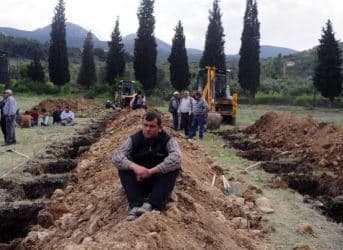Following the May 13 mine explosion in Soma, Turkey, which killed at least 282 miners and left dozens trapped after the blast, the Turkish government declared three days of mourning.
Despite the tragedy, Turkey’s economy remains firmly wedded to the use of coal. Even as Turkey moves towards the construction of its first two nuclear power plants at Akkuyu near the Mediterranean and Sinop on the Black Sea, coal-fired power plants remains an important element in Turkey's electricity generation mix, and will be for the foreseeable future.
According to the U.S. government’s Energy Information Administration, in 2012 Turkey imported 23 percent of its total coal supply, but analysts project that Turkey may increase its imports of coal in the future as its importance for electricity generation increases.
While coal, in the form of lignite, has been mined in the Zonguldak Black Sea region since Ottoman times, the Soma site is relatively new. Given the high cost of energy imports, there is renewed interest in exploiting Turkey's domestically produced lignite, as it accounts for approximately 75 percent of Turkey’s coal supply.
Seeking to expand its lignite production, last week Turkish Energy Minister Taner Y?ld?z told reporters that Turkey and China are negotiating over possible Chinese investment in Turkey’s Af?in-Elbistan coalfield and adjacent power plant project, a deal worth $10-12 billion. Y?ld?z told reporters, “This is a huge project. We should design the project right at Af?in-Elbistan field, we have vast knowledge. We are working with China in this respect.”
According to the Turkish Energy Ministry, the Af?in-Elbistan region holds around 40 percent of Turkey’s lignite and could provide up to 8,000 megawatts of power in south Turkey, if the coal potential is fully exploited.
In January 2013, the Turkish government and Abu Dhabi’s state-owned National Energy Co. (TAQA) signed a deal to develop Af?in-Elbistan, but when, eight months later, TAQA said it was delaying the investment, Turkey began talks with other foreign companies, including from China and South Korea.
The tragedy at Soma will cast a shadow over new projects such as Af?in-Elbistan for some time.
According to Turkey’s state-run Anadolu Ajans? news agency, since 1941 3,000 Turkish miners have been killed and more than 100,000 wounded in work accidents. The Turkish Statistical Institute notes that last year, 13,000 miners were injured on the job.
Five labor unions called for a one-day nationwide strike on May 15. Among their demands were better health and safety standards for miners, and the use of independent mine inspectors. (In a measure of Turkish Prime Minister Recep Tayyip Erdo?an’s response, police armed with tear gas and water cannons broke up protests in Soma by families of the miners.)
Much depends on how Erdo?an is perceived as handling the tragedy, but his initial response drew some criticism. On May 14, after visiting Soma, Erdo?an remarked during a press briefing that in March the privately owned and operated Soma mine had passed security and health regulation inspections, adding, “Let’s please not pretend such incidents do not occur in mines. These are ordinary developments. There is something like labor accidents in literature. This is part of the nature of this business.”
Seeking to put the Soma disaster in context, Erdo?an then rattled off a list mine accidents in the late 19th and early 20th century in countries such as the United States, the United Kingdom, China, France and Japan, inferring that such tragedies are an inevitable byproduct of mining.
ADVERTISEMENT
Erdo?an also announced that a judicial investigation into the Soma tragedy has already started.
The result of the investigation will be a litmus test for the Erdo?an and his relationship to the nation’s mining industry. If the investigation whitewashes the Soma tragedy, unions and opposition parties will be energized, claiming that the government puts “profits over people.” One thing is certain: potential Chinese investors in Af?in-Elbistan will also be watching the results of the judicial investigation with particular interest.
By John C.K. Daly of Oilprice.com


















